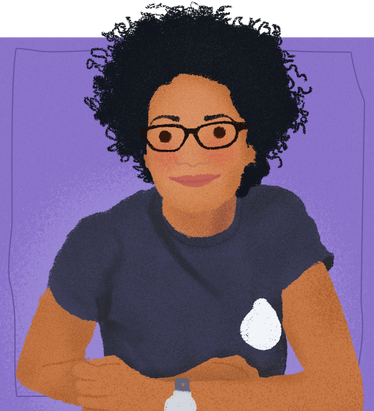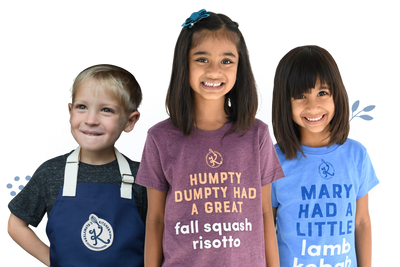
Taste Bud Profile
Zoe Adjonyoh

I sincerely wish that I had known Chef Zoe and listened to what she has to say when I was younger. She exudes confidence, which is itself inspiring, but more importantly—she exudes joy. I've had the great privilege to try some of her cooking, and have also made some of her recipes at home, and it really is a celebration of who she is, and the journey she has been on.



Zoe Adjonyoh: I grew up for the most part in South East London. My mum is Irish, and my dad is Ghanaian. Obviously it was much easier to get to Ireland than Ghana, and as a result I spent much more time with that side of my family. I had a really good understanding of my Irish side—what it smelled like, tasted like, felt like to be Irish. But we didn’t have that experience with my dad’s Ghanaian side, and we weren’t integrated into the Ghanaian community in London. They’re both very much products of their cultures, and as a result, growing up “English” was weird. I didn’t have cultural ties to England, though I lived there. My relationship with food comes from the context of my parents’ cultures; these are two very different cultures on the surface, but food is absolutely central to both, especially in terms of family and feeding. So my relationship with feeding people started very early for me, and mostly with my Irish family. We’d split mostly along stereotypical gender lines, with the women cooking for the men (who always got bigger portions than me, which really wound me up!). But I did love cooking, and the family connection of all of it.
So why do I cook Ghanaian food? Both of my parents were immigrants. Food was important for them to connect to their culture—for nostalgia, and comfort.

My mum’s mum would send Irish care packages with soda bread and the best assortments of Cadbury’s chocolates, and receiving them was always very exciting. Everything was shared. When she cooked for us, she cooked as a mother, for the family. My dad was different. He’d come home with ingredients that were completely unfamiliar to me—totally unique appearances, smells, textures, all of that. Things like fermented maize, which we call kenkey, or any number of smoked salted fish like mackerel, catfish, or tilapia. A hot pepper sauce made with smoked prawns called shito. Dawadawa, or fermented locust bean. But he didn’t buy all of those ingredients to cook for us—he’d cook for himself. This was so intriguing for me. For him, his relationship with the food was simply so he could revisit his home, in a way, and he had a laser focus on it when he would prepare and eat it. I think it’s possible he thought we wouldn’t be interested, but I also think that when you leave your country to make your way in the world, it can be tempting to leave behind the “limitations” as you see them in your own culture and go for assimilation. But I always had a hankering to be attached to him, and to Ghana. I wanted to understand my roots. I watched him constantly. And eventually I just kept cooking it myself, and made my business out of it! But as a child, it was about finding out more about myself, and my relationship to my culture and my father.
I had no intention of being a chef, really. Ghana Kitchen really started as a way to make pocket money. There was a street festival outside my front door, and they didn’t have any food that I could see. So I made a big pot of peanut butter stew and plantains. Extremely simple food. It drew a huge crowd because it smells amazing—super spicy, piquant, sweet, peanut-buttery—and I threw a big marrow bone in which made it even richer and more wonderful. It created a lot of questions in the crowd, chiefly, “Where is Ghana?” “What is a plantain?” And so on. It generated a lot of questions, and I engaged as much as I could. It was intriguing that there was so much interest, and they asked me to do it again. It evolved from there. I live very close to the Ridley Road Market, an African food market. There was no ingredient I couldn’t find. I’d go to the market 3 or 4 times a week, and talk to the women about the ingredients and how they used them. I didn’t necessarily want to replicate their use, I just wanted to get a sense of why they did what they did with them. I knew I couldn’t be a traditional Ghanaian aunty—that wasn’t my relationship with the food or with Ghana. My intention was always to adapt. I took myself to Ghana after a 30 year absence. I reconnected with family, and I learned a lot of different ways of cooking, and more importantly, how vast Ghana is, and how varied the food can be throughout the country. There are about 50 different tribes in Ghana. My grandmother is Fante, my aunt is Ewe, and a woman who worked at the house was Ashanti. They all had a different recipe and technique for making the same dish, and they each thought theirs was the best!
What I gained after that trip was of course many more recipes, ideas, and knowledge, but also license. I realized how people were adapting recipes home to home, and that there wasn’t one “true” anything. I came back and decided to reimagine my food confidently, the way I wanted to. It was about celebrating the ingredients and the flavors rather than trying to be authentically or traditionally Ghanaian.
One thing that is very challenging for me is the idea that there is one “Ghanaian” food. There is such huge variation in the cuisine across the country, but it seems like we can’t explain that to people, and to media. There is a tendency to focus on just one thing, which is incredibly reductive. For example, if you want to read about Ghanaian food, you’ll read about jollof. Sure, it’s delicious. But it’s not every day food— it’s celebration food. But it’s the only conversation about Ghanaian food out there. You’ll read about a Jollof war between Nigeria and Ghana, presented in this very colonial way of highlighting aggression and difference through a very narrow scope, instead of ever hearing about how Nigeria and Ghana collaborate within their food systems and work together to maintain tradition. The two countries work together to preserve yams—yams are more important to the culture than jollof!—because they both know how important it is to their export economies, but you’ll never hear about that. There is education that has to go along with it, even for Ghanaians. If your culture is only ever discussed through a narrow lens, then you will never know how vast and beautiful it is, and how much you haven’t tried. This is something that needs to be changed through de-colonization. We have to be allowed to form our relationships with our own cuisines, outside of the white-gaze narrative of what is “normal”, and what is “comfortable” for people to try and eat. I want to bring the gaze not to what you think something should be, but rather to the elements of what it can be— the ingredients, their origins, etc. No more changing recipes because an ingredient might not be easy to find in a standard grocery store. You can google, right? An entire diaspora can cook their foods right under your nose by ordering what they need from the internet, you can too!
Own who you are. Learn to love yourself. All of your power and all of your purpose is inside you. Everything you want to achieve in life is possible, because of the fact that you were born. If you think it, you can do it—that thought doesn’t exist without you.
Many of us have grown up under the gaze of white supremacy, and habitually folded who we are into ourselves to make other people comfortable. We’ve doubted our own voices, intuition, capability, been told we have to work 4 times harder than the other person, or have been led to believe we don’t deserve to earn as much. Breaking out of that requires one thing above all else: understanding that you are enough. Always hold that, and always believe that. We need to teach children how to hold that knowledge, so that it can’t be taken away from them. Celebrate who you are, and celebrate what came before you. Food is an incredibly powerful way to show other people what is amazing about you. I try to empower and inspire by being my most authentic self. Be you. And be the very best you that you can be.

